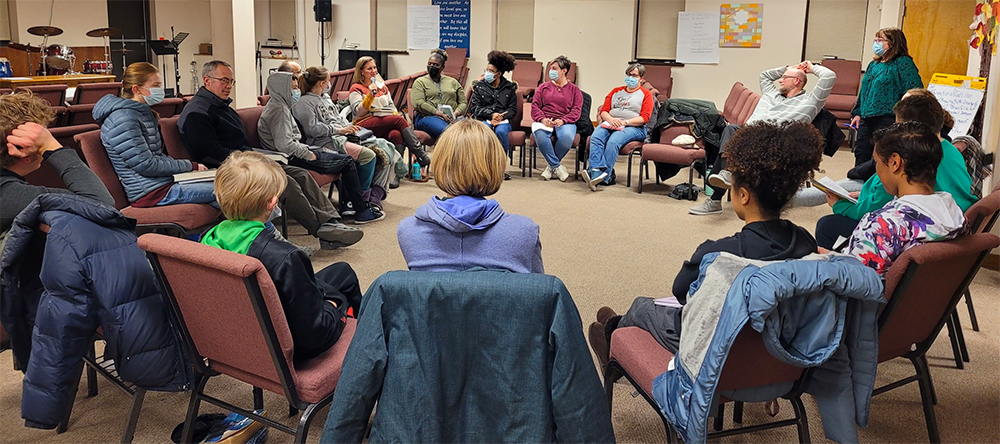Annual Praying and Fasting Before the LORD
Every year, OCMC uses January as a Sabbath month. We slow down and halt most ministries to individually and corporately seek God weekly through prayer and fasting. In 2023, we are focusing on four areas:
-
Lament and crying out to God
-
Resisting the enemy
-
Boldness/risk taking
-
Going deep
What is prayer and fasting?
Fasting is a tool that God uses to increase our spiritual sensitivity and turn us toward Him. Although prayer is a command (Matt. 6:5-14), fasting is a practice that Jesus expects from his followers (Matt. 6:16-18). Both require seeking God diligently in order to have impact (publicly and privately). As we sharpen our spirituality through praying and fasting, God is able to do more in and through us and expose our tendency to rely on our own human efforts rather than His Spirit.
There are 3 main functions of the soul: the will (body), the intellect (mind) & the emotions (heart).
I Want (Body) I Think (Mind) I Feel (Heart)
5 Reasons for Fasting/Praying
Through prayer and fasting, a posture of obedience and humility toward God challenges us to discipline these three functions bringing them into subjection to His will and ways.
1. Spiritual Preparation
-
Moses prays for help and the LORD said He will be with Him. (Ex. 33:12-14)
-
Moses fasted for 40 days when the LORD told him to write the Ten Commandments. (Ex. 34:28)
-
Jesus fasted for 40 days before he was tempted by Satan. (Matt. 4:1-2)
-
Jesus prays to the Father before his arrest. (John 17)
-
The church in Antioch fasted and prayed over Barnabas and Saul as directed by the Holy Spirit. (Acts 13:1-3)
2. Seek God’s Favor/Protection
-
David prayed to God over his sins (Ps. 51)
-
Esther called everyone to fast (including herself) before she entered the presence of the king on behalf of her people (Esther 4:15-17)
-
Some scholars imply Paul fasted as a prisoner to keep the ship from sinking on his way to Rome. (Acts 27)
-
The believers pray together after the apostle’s release by the Sanhedrin. (Acts 4:23-31)
3. Grieving Sin/Loss
-
Some scholars suggest that Job prayed and fasted through the act of tearing his clothes and shaving his head because of the death of his children and livestock. (Job 1:20-22)
-
David fasted when Jonathan and his father were killed (2 Sam. 1:12)
-
The king of Nineveh announces a fast for everyone in the city because of Jonah’s message. (Jonah 3:7-9)
4. Spiritual Insight/Sensitivity
-
Daniel fasted to better understand his visions. (Dan. 10:2-4,12)
-
Paul prays for the Ephesians that they will receive the Spirit of wisdom and revelation. (Eph. 1:16-21)
5. Prophetic Protest/Demonstration
-
Daniel refused to eat food at King Nebuchadnezzar’s table. (Dan. 1:8)
-
Nehemiah’s fasting and praying preceded his boldness to address King Aratxerxes. (Neh. 1-2)
Secondary Fasting Tactics
-
Intellect (news/info/mental sabbath)
-
Tech/Work (technology/sabbath/service)
-
Culture (media/entertainment/sports/image)
-
Social (solitude/silence)
The Bible speaks of believers fasting primarily from food to focus more on God. But in our modern age, there are other elements of culture available to us because of leisure, entertainment and technology. It is important that we acknowledge that we can easily allow these elements to rob us of clarity with God. Therefore, we urge leaders and the congregation to examine their hearts in relation to the secondary fasting tactics above and decide how to engage.
We can fast simultaneously but practice it privately. (We can pray individually and collectively.) But the secondary fasting tactics can be considered individually and collectively where we are most at risk. Our desire to hear from the Lord increases our submission and dependence on Him and others. It puts our difficult experiences in perspective (past and present trauma) protecting us from idolatry (worship of pain, pleasure, self, etc.)


